英语常见虚拟语气最全总结
- 格式:doc
- 大小:68.50 KB
- 文档页数:11
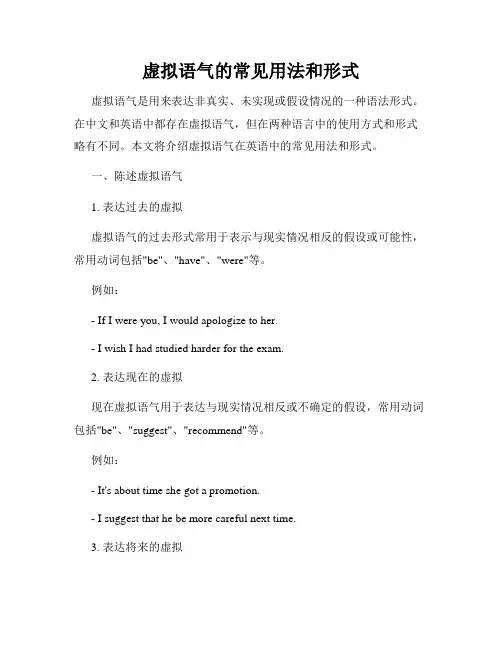
虚拟语气的常见用法和形式虚拟语气是用来表达非真实、未实现或假设情况的一种语法形式。
在中文和英语中都存在虚拟语气,但在两种语言中的使用方式和形式略有不同。
本文将介绍虚拟语气在英语中的常见用法和形式。
一、陈述虚拟语气1. 表达过去的虚拟虚拟语气的过去形式常用于表示与现实情况相反的假设或可能性,常用动词包括"be"、"have"、"were"等。
例如:- If I were you, I would apologize to her.- I wish I had studied harder for the exam.2. 表达现在的虚拟现在虚拟语气用于表达与现实情况相反或不确定的假设,常用动词包括"be"、"suggest"、"recommend"等。
例如:- It's about time she got a promotion.- I suggest that he be more careful next time.3. 表达将来的虚拟将来虚拟语气用于表达与现实情况相反或不可能实现的假设,常用动词包括"should"、"were to"等。
例如:- If I should win the lottery, I would buy a big house.- If it were to rain, the event would be canceled.二、命令虚拟语气当表示一种命令、建议或要求时,常使用虚拟语气来显得客气或委婉。
例如:- I suggest that you arrive on time for the meeting.- It's important that he be there for the ceremony.三、愿望虚拟语气愿望虚拟语气用于表达对过去、现在或将来的愿望、期望或希望。
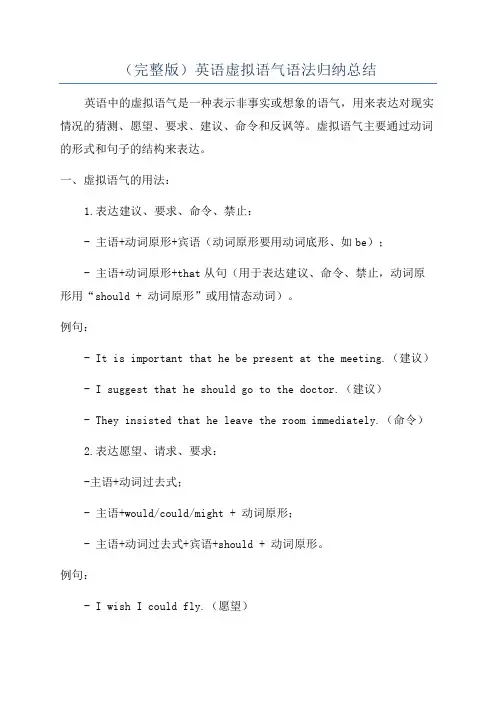
(完整版)英语虚拟语气语法归纳总结英语中的虚拟语气是一种表示非事实或想象的语气,用来表达对现实情况的猜测、愿望、要求、建议、命令和反讽等。
虚拟语气主要通过动词的形式和句子的结构来表达。
一、虚拟语气的用法:1.表达建议、要求、命令、禁止:- 主语+动词原形+宾语(动词原形要用动词底形、如be);- 主语+动词原形+that从句(用于表达建议、命令、禁止,动词原形用“should + 动词原形”或用情态动词)。
例句:- It is important that he be present at the meeting.(建议)- I suggest that he should go to the doctor.(建议)- They insisted that he leave the room immediately.(命令)2.表达愿望、请求、要求:-主语+动词过去式;- 主语+would/could/might + 动词原形;- 主语+动词过去式+宾语+should + 动词原形。
例句:- I wish I could fly.(愿望)- I would appreciate it if you could help me.(请求)3.表示虚拟条件:- If条件从句中的谓语动词用过去完成时,主句用would/should/might/could + have + 过去分词;- If条件从句中的谓语动词用过去时,主句用would/should/could + 动词原形。
例句:- If I had known his phone number, I would have called him.(虚拟条件)- If you had listened to me, we could have finished the project earlier.(虚拟条件)4.表达建议、要求、祝愿:- If only内部称述 + 主语 + 过去式。
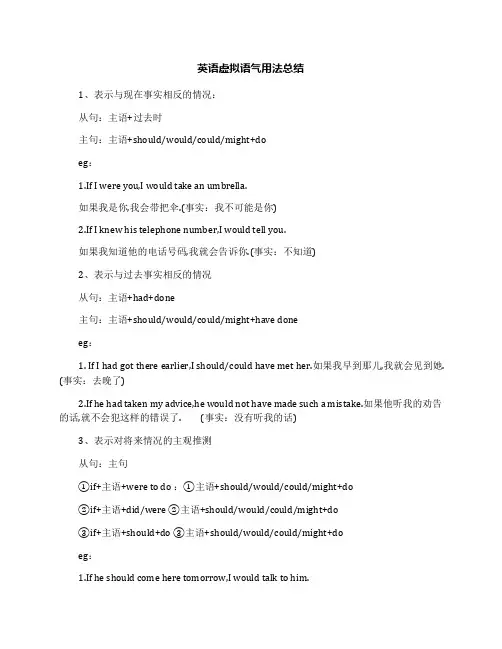
英语虚拟语气用法总结1、表示与现在事实相反的情况:从句:主语+过去时主句:主语+should/would/could/might+doeg:1.If I were you,I would take an umbrella.如果我是你,我会带把伞.(事实:我不可能是你)2.If I knew his telephone number,I would tell you.如果我知道他的电话号码,我就会告诉你.(事实:不知道)2、表示与过去事实相反的情况从句:主语+had+done主句:主语+should/would/could/might+have doneeg:1. If I had got there earlier,I should/could have met her.如果我早到那儿,我就会见到她. (事实:去晚了)2.If he had taken my advice,he would not have made such a mistake.如果他听我的劝告的话,就不会犯这样的错误了.(事实:没有听我的话)3、表示对将来情况的主观推测从句:主句①if+主语+were to do :①主语+should/would/could/might+do②if+主语+did/were ②主语+should/would/could/might+do③if+主语+should+do ③主语+should/would/could/might+doeg:1.If he should come here tomorrow,I would talk to him.如果他明天来这儿的话,我就跟他谈谈.(事实:来的可能性很小)2.If there were a heavy snow next Sunday,we would not go skating.如果下周日下大雪,我们就不能去滑冰了.(事实:不知能否下雪)3.If she were to be here next Monday,I would tell her about the matter.如果她下周一来这儿的话,我就会告诉她这件事的始末.。
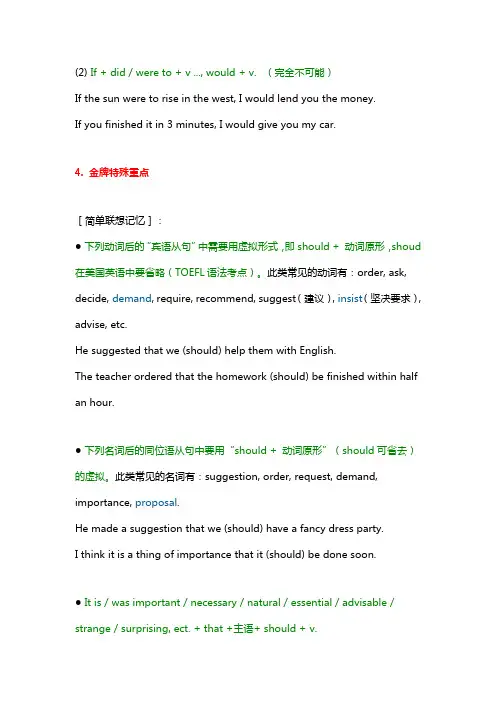
英语语法总结虚拟语气虚拟语气用来表达不可能或难以实现的愿望,与事实相反的假设,通常分为基本的三种形式。
1. 与现在事实相反的虚拟:If + did / were + ..., ... would/ should/ could/ might + do (动词原形)If I were you, I would go abroad at once. (I am not you.)If he knew it now, he could help me. (He doesn't know it now.)2. 与过去事实相反的虚拟:If + had done + ..., ... would (might) have done ...If I had known your telephone number yesterday, I would have phoned you. (I didn't know your telephone number.)If you had come here a little earlier just now, you might have met her. (You didn't come here earlier.)3. 与将来事实相反的虚拟:(1) If + should + v., ... would + v. (可能性很小)(译作“万一”)If it should rain tomorrow, you could stay at home.If I should fail, what should Ido?(2) If + did / were to + v ..., would + v. (完全不可能)If the sun were to rise in the west, I would lend you the money.If you finished it in 3 minutes, I would give you my car.4. 金牌特殊重点[简单联想记忆]:●下列动词后的“宾语从句”中需要用虚拟形式,即should + 动词原形,shoud 在美国英语中要省略(TOEFL语法考点)。

英语语法——虚拟语气
虚拟语气:'不可能'假设
与现在相反
条件句:过去式(were)
主句:would+动词原形
If I were you I would not be such scheming.
与将来相反
条件句:should/were to+动词原形
主句:would/should/could/might+动词原形
If it should be clear day tomorrow,I would bath my dog.
与过去相反
条件句: had +动词过去分词
主句:would have +动词过去分词
If I had known you are such scheming,I would not have trusted you.
虚拟语气:愿望, 请求,建议,命令....
Wish
对现在的愿望: wish +动词过去式
I wish my neck don’t ached.
对过去的愿望wish + had/would have +动词过去分词
I wish I had protected my neck from indisposition.
对将来的愿望: wish + should/would/could/might/ +动词原形
I wish my neck could cured.
demand, suggest,insist, order...+should +动词原形。
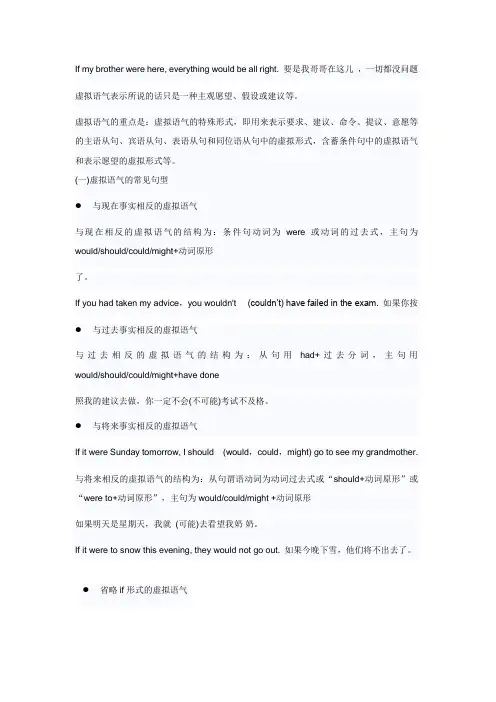
If my brother were here, everything would be all right. 要是我哥哥在这儿,一切都没问题虚拟语气表示所说的话只是一种主观愿望、假设或建议等。
虚拟语气的重点是:虚拟语气的特殊形式,即用来表示要求、建议、命令、提议、意愿等的主语从句、宾语从句、表语从句和同位语从句中的虚拟形式,含蓄条件句中的虚拟语气和表示愿望的虚拟形式等。
(一)虚拟语气的常见句型●与现在事实相反的虚拟语气与现在相反的虚拟语气的结构为:条件句动词为were或动词的过去式,主句为would/should/could/might+动词原形了。
If you had taken my advice,you wouldn't (couldn’t) have failed in the exam. 如果你按●与过去事实相反的虚拟语气与过去相反的虚拟语气的结构为:从句用had+过去分词,主句用would/should/could/might+have done照我的建议去做,你一定不会(不可能)考试不及格。
●与将来事实相反的虚拟语气If it were Sunday tomorrow, I should (would,could,might) go to see my grandmother. 与将来相反的虚拟语气的结构为:从句谓语动词为动词过去式或“should+动词原形”或“were to+动词原形”,主句为would/could/might +动词原形如果明天是星期天,我就(可能)去看望我奶奶。
If it were to snow this evening, they would not go out. 如果今晚下雪,他们将不出去了。
●省略if形式的虚拟语气有时条件从句中的动作和主句中的动作发生的时间不一致(表示错综时间的虚拟语气),省略连词if。
在书面语中,如果虚拟条件从句中有were,had 或should,可以把if省略,把这几个词放到主语之前,构成主谓倒装。
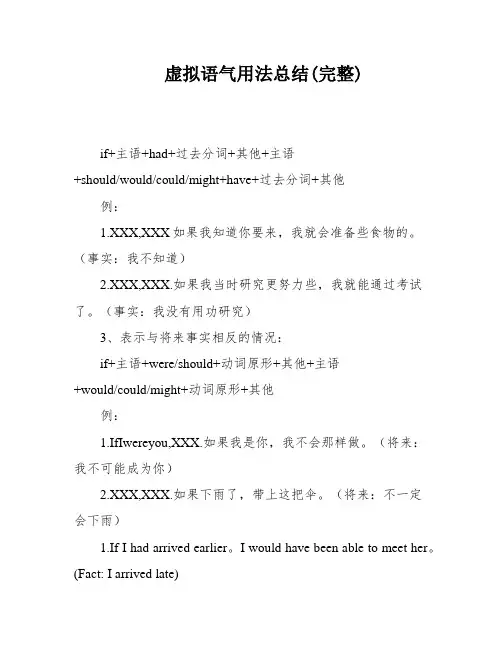
虚拟语气用法总结(完整)if+主语+had+过去分词+其他+主语+should/would/could/might+have+过去分词+其他例:1.XXX,XXX如果我知道你要来,我就会准备些食物的。
(事实:我不知道)2.XXX,XXX.如果我当时研究更努力些,我就能通过考试了。
(事实:我没有用功研究)3、表示与将来事实相反的情况:if+主语+were/should+动词原形+其他+主语+would/could/might+动词原形+其他例:1.IfIwereyou,XXX.如果我是你,我不会那样做。
(将来:我不可能成为你)2.XXX,XXX.如果下雨了,带上这把伞。
(将来:不一定会下雨)1.If I had arrived earlier。
I would have been able to meet her。
(Fact: I arrived late)2.If he had XXX my advice。
he would not have made such a mistake。
(Fact: He didn't listen to me)3.If he were to come here tomorrow。
I would talk to him。
(Fact: It's XXX he will come)In expressing ns。
orders。
requests。
etc。
the subjunctive mood is often used in the object clause。
with the verb in the form of "should + infinitive," which can be omitted.Other uses of XXX:1.The subjunctive mood is used in the object clause after "wish" to express a XXX fact。
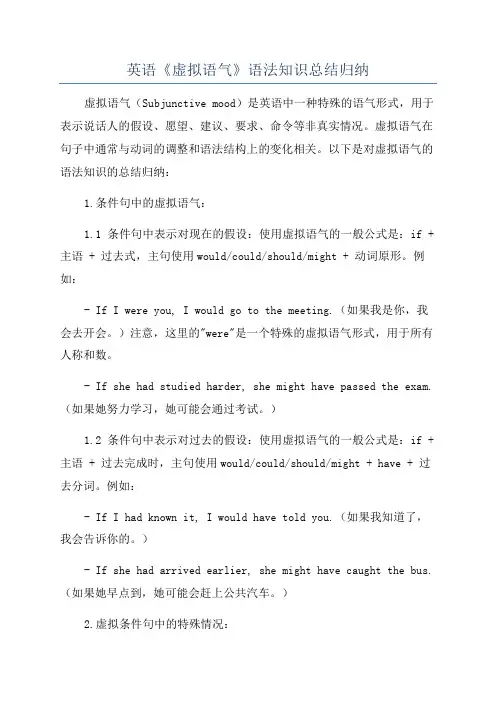
英语《虚拟语气》语法知识总结归纳虚拟语气(Subjunctive mood)是英语中一种特殊的语气形式,用于表示说话人的假设、愿望、建议、要求、命令等非真实情况。
虚拟语气在句子中通常与动词的调整和语法结构上的变化相关。
以下是对虚拟语气的语法知识的总结归纳:1.条件句中的虚拟语气:1.1 条件句中表示对现在的假设:使用虚拟语气的一般公式是:if + 主语 + 过去式,主句使用would/could/should/might + 动词原形。
例如:- If I were you, I would go to the meeting.(如果我是你,我会去开会。
)注意,这里的"were"是一个特殊的虚拟语气形式,用于所有人称和数。
- If she had studied harder, she might have passed the exam.(如果她努力学习,她可能会通过考试。
)1.2 条件句中表示对过去的假设:使用虚拟语气的一般公式是:if + 主语 + 过去完成时,主句使用would/could/should/might + have + 过去分词。
例如:- If I had known it, I would have told you.(如果我知道了,我会告诉你的。
)- If she had arrived earlier, she might have caught the bus.(如果她早点到,她可能会赶上公共汽车。
)2.虚拟条件句中的特殊情况:2.1 在虚拟条件句中表示命令、建议时,主句中的动词可以使用动词原形(而不是would/could/should/might + 动词原形)。
例如:- If you have any questions, please let me know.(如果你有任何问题,请告诉我。
)- If I were you, I would take a break.(如果我是你,我会休息一下。

英语中虚拟语气用法总结1. 与现在事实相反的虚拟语气用于表达与现在相反的情况,即事情并不是现在所描述的那样。
通常用“were”引导虚拟语气。
例如:If I were you, I would quit this job.(如果我是你,我会辞职。
)2. 与过去事实相反的虚拟语气用于表达与过去相反的情况,即过去并不是现在所描述的那样。
通常用“had”引导虚拟语气。
例如:If I had known earlier, I would have attended the meeting.(如果我早知道,我会参加会议的。
)3. 与过去将来事实相反的虚拟语气用于表达过去将来时,即过去某个时间点以前就应该发生的事情并没有发生的情况。
通常用“had”引导虚拟语气。
例如:If I had finished my work earlier, I would have gone to the movieswith my friends.(如果我早点完成工作,我会和朋友去看电影的。
)4. 与现在将来可能性相反的虚拟语气用于表达现在将来的可能性,即可能会发生但不太可能的情况。
通常用“should”或“were to”引导虚拟语气。
例如:If I were to win the lottery, I would travel around the world.(如果我中了彩票,我会周游世界的。
)5. 与过去将来可能性相反的虚拟语气用于表达过去将来的可能性,即曾经可能会发生但最终却没发生的情况。
通常用“should”或“were to”引导虚拟语气。
例如:If I should fail the exam, I would have to retake it in three months.(如果我考试不及格,我就得三个月后再次参加考试。
)。
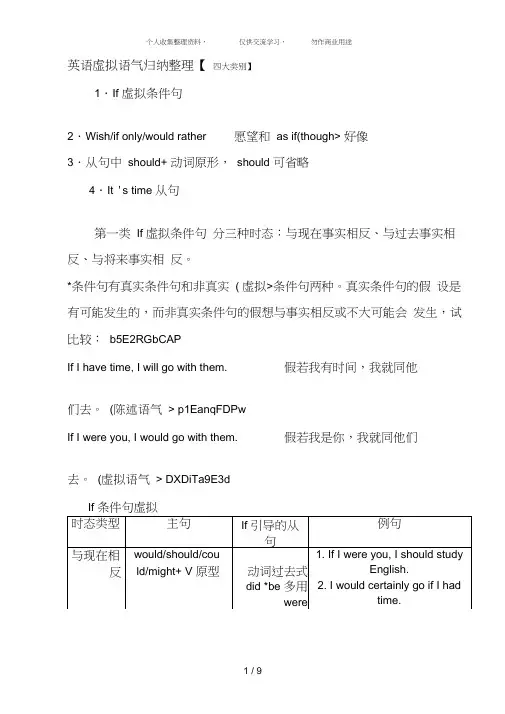
英语虚拟语气归纳整理【四大类别】1.If 虚拟条件句2.Wish/if only/would rather 愿望和as if(though> 好像3.从句中should+ 动词原形,should 可省略4.It 's time 从句第一类If 虚拟条件句分三种时态:与现在事实相反、与过去事实相反、与将来事实相反。
*条件句有真实条件句和非真实( 虚拟>条件句两种。
真实条件句的假设是有可能发生的,而非真实条件句的假想与事实相反或不大可能会发生,试比较:b5E2RGbCAPIf I have time, I will go with them. 假若我有时间,我就同他们去。
(陈述语气> p1EanqFDPwIf I were you, I would go with them. 假若我是你,我就同他们去。
(虚拟语气> DXDiTa9E3dIf 条件句虚拟注:几点特别说明1、l would/should/could/might 主句谓语中的should 主要用于第一人称后;would 表示结果还表示过去经常常常做某事,might 表示可能性,could 表示能力、允许或可能性。
比较:RTCrpUDGiTIf you tried again ,you would succeed. 要是你再试一试,你就会成功的。
(would 表结果> 5PCzVD7HxAIf you tried again ,you might succeed. 要是你再试一试,你可能会成功的。
(might 表可能> jLBHrnAILgIf you tried again ,you could succeed. 要是你再试一试,你就能成功了。
(could 表能力> xHAQX74J0X2、错综时间虚拟条件句:即条件从句与主句所指时间不一致,如从句指过去,而主句即指的是现在或将来,此时应根据具体的语境情况,结合上面提到的三种基本类型对时态作相应的调整:LDAYtRyKfE If it had rained last night, the ground would be wet now. 要是昨晚下过雨的话,现在地面就会是湿的。
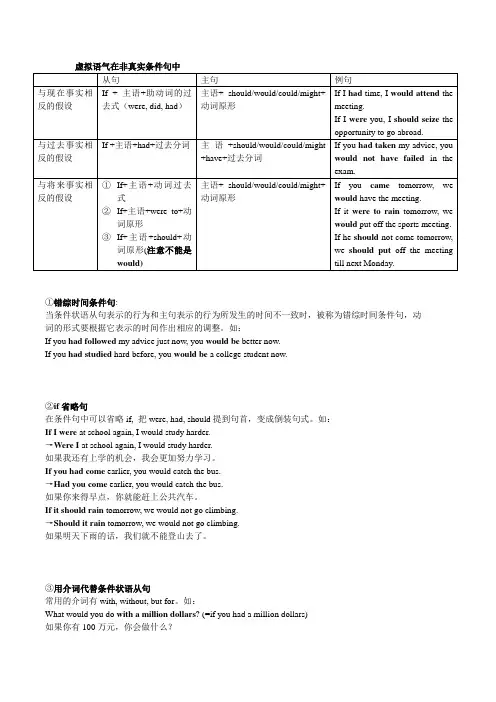
虚拟语气在非真实条件句中①错综时间条件句:当条件状语从句表示的行为和主句表示的行为所发生的时间不一致时,被称为错综时间条件句,动词的形式要根据它表示的时间作出相应的调整。
如:If you had followed my advice just now, you would be better now.If you had studied hard before, you would be a college student now.②if省略句在条件句中可以省略if, 把were, had, should提到句首,变成倒装句式。
如:If I were at school again, I would study harder.→Were I at school again, I would study harder.如果我还有上学的机会,我会更加努力学习。
If you had come earlier, you would catch the bus.→Had you come earlier, you would catch the bus.如果你来得早点,你就能赶上公共汽车。
If it should rain tomorrow, we would not go climbing.→Should it rain tomorrow, we would not go climbing.如果明天下雨的话,我们就不能登山去了。
③用介词代替条件状语从句常用的介词有with, without, but for。
如:What would you do with a million dollars? (=if you had a million dollars)如果你有100万元,你会做什么?We couldn’t have finished the work ahead of time without your help. (=if we hadn’t got your help) 没有你的帮助,我们不可能提前完成这项工作。
虚拟语气:表示说的话不是事实,表示说的话不是事实,不可能发生或者说可能性很小的情况,不可能发生或者说可能性很小的情况,不可能发生或者说可能性很小的情况,表达一种愿望、表达一种愿望、表达一种愿望、建建议、假设。
议、假设。
一、条件状语从句中的用法一、条件状语从句中的用法从句 谓语形式谓语形式主句 谓语形式谓语形式现在现在were/ didwould/could/should (+not) + do 过去过去 had donewould/could/should/might (not)+ have done将来将来1. were/did2. should do3. were to dowould/could/should/might (not) + do简单记法:简单记法:if were/did, would doif had done, would have done if were to do/should do, would do举例:举例:If I were you, I would do nothing about it.If you had taken your teacher’s advice, you wouldn’t have made such a mistake. If it were to/ should rain tomorrow(表示降水率很低),they wouldn’t go shopping.附注:附注:虚拟语气,条件状从倒装虚拟语气,条件状从倒装状语从句中,去掉if, 提前were/ had/ should 如:If I were you, I would give up. →Were I you, I would give upIf you had taken the advice, you would have…. →Had you taken the advice, you would have… If the world should come to an end,…… →Should the world come to an end……另外,without, but for, otherwise 构成的条件状语从句中,也有含蓄的虚拟语气构成的条件状语从句中,也有含蓄的虚拟语气 But for the populariza on of electricity, we would lead a whole different life today. (populariza on 普及,publicity 宣传) Without your help, I would have failed.We’ll go earlier, otherwise we wouldn’t get a seat. (表示可能性小)(表示可能性小)但其实,高中英语考试也常考:但其实,高中英语考试也常考:错综虚拟语气条件句错综虚拟语气条件句 即:即:假设条件状从发生的时间与所假设的谓语动词不一致,此时,主句和从句要根据各自的时间而定。
虚拟语气的用法和常见句型虚拟语气是英语中一种用于表示假设、愿望、建议或与事实相反的情况的语法结构。
虚拟语气的存在增添了句子的表达层次,丰富了语言的表达能力。
在本文中,我们将探讨虚拟语气的用法和常见句型。
一、表示假设的虚拟语气1. 与现在事实相反的假设:如果我是亿万富翁,我会捐赠大部分财富给慈善机构。
2. 与过去事实相反的假设:如果我选了不同的专业,我的人生可能完全不同。
3. 与将来事实相反的假设:如果明天不下雨,我们就去郊游。
4. 表示过去某个时间点之前的假设:我希望我在展览开幕式上能见到那位艺术家,可惜我错过了。
二、表示愿望的虚拟语气1. 对现在或将来的愿望:我真希望你能成功。
2. 对过去的愿望:我真希望我参加了那个会议。
三、表示建议的虚拟语气1. 建议:他建议我尽早去见医生。
2. 要求:老师要求我们每天完成作业。
四、常见的虚拟语气句型1. If only... (要是...该多好)If only I were younger, I could join the marathon.(要是我年轻些就好了,我就可以参加马拉松了。
)2. It's time... (是时候...了)It's time we started planning for our summer vacation.(是时候我们开始为暑假计划了。
)3. I wish... (我希望...)I wish I had more time to spend with my family.(我希望我有更多时间陪伴家人。
)4. Suppose... (假设...)Suppose it rains tomorrow, what should we do?(假设明天下雨了,我们该怎么办?)5. If it were not for... (要不是因为...)If it were not for your help, I wouldn't have finished the project on time.(要不是因为你的帮助,我不会按时完成这个项目。
英语虚拟语气的用法归纳英语虚拟语气是一种语法现象,用来表达与事实相反、假设、愿望、建议等与现实情况不符的情态。
以下是英语虚拟语气的用法归纳:1. 虚拟条件句:a. Type 1:表示可能实现的条件句,使用"if + 一般过去时",主句使用"would/ could/ should/ might + 动词原形"。
示例:If I had money, I would buy a car.(如果我有钱,我会买车。
)b. Type 2:表示不可能实现的条件句,使用"if + 过去式",主句使用"would/ could/ should/ might + 动词原形"。
示例:If I were you, I would quit that job.(如果我是你,我会辞职。
)c. Type 3:表示过去未实现的条件句,使用"if + 过去完成时",主句使用"would/ could/ should/ might + have + 过去分词"。
示例:If I had studied harder, I would have passed the exam.(如果我学得更努力,我就能通过考试。
)2. 虚拟表达愿望或建议:a. 表达愿望时,使用"wish + 主语 + 过去式"。
示例:I wish I were taller.(但实际上我不高。
)b. 表达建议、要求或命令时,使用"would/ could/ might + 动词原形"。
示例:I suggest that you should study harder.(我建议你应该学习更努力。
)3. 虚拟表达假设:a. 使用"as if/ though"引导的从句中,使用虚拟语气,表示与事实相反。
英语虚拟语气语法总结虚拟语气(Subjunctive Mood)是英语中一种特殊的语气形式,用来表达非真实情况、假设情况、愿望、建议等。
虚拟语气需要根据上下文来区分,采用特定的动词形式。
以下是对英语虚拟语气的语法总结:一、假设与虚拟条件:1. 表示假设情况时,使用"if"引导从句,主句使用虚拟语气。
- If I were you, I would study harder.(如果我是你,我会更努力学习。
)- If you had told me earlier, I could have helped you.(如果你早告诉我,我本可以帮你。
)2. 当表示与现实相反的情况时,主句使用过去时的虚拟语气,从句使用过去完成时的虚拟语气。
- He wishes he were taller.(他希望自己长得更高。
)- I wish I hadn't eaten so much.(我希望我没吃那么多。
)3. 在嵌入式虚拟语气中,主句使用过去时的虚拟语气,从句使用过去完成时的虚拟语气。
- She suggested that he have a rest.(她建议他休息一下。
)- It is important that he be on time.(他准时到达很重要。
)二、愿望与建议:1. 表示愿望时,使用"would like"或"hope",后接宾语从句。
- I would like you to come to my party.(我希望你来参加我的派对。
)- She hopes that the weather will be good tomorrow.(她希望明天天气会好。
)2. 表示建议时,使用"should"或"would rather"等,后接宾语从句。
- I suggest that you see a doctor.(我建议你去看医生。
英语中的虚拟语气用法总结英语中的虚拟语气是用来表达非真实、假设或建议的语气。
下面是一些常见的虚拟语气用法总结:1. 虚拟条件句- 类型一:对现在或将来的假设- If + 主语 + 动词 (过去式),主语 + 动词(would/could/should/might)- Example: If I were rich, I would travel the world.- 类型二:对过去的假设- If + 主语 + had (过去分词),主语 + would/could/should/might + have + 过去分词- Example: If I had studied harder, I would have passed the exam.2. 虚拟语气表建议或命令- 主语 + 动词原形 + (that) + 主语 + 动词原形- Example: He suggested that she go to the doctor.3. 虚拟语气表愿望- 类型一:对现在或将来的愿望- 主语 + wish/es + 主语 + 动词过去式- Example: I wish I were taller.- 类型二:对过去的愿望- 主语 + wish/es + 主语 + 过去完成时- Example: I wish I had studied more.4. 虚拟语气表态度或建议- It is (high) time + 主语 + 过去式- Example: It is time that she left.- 主语 + would rather + 主语 + (did) + 动词原形- Example: She would rather he didn't smoke.这些是英语中常用的虚拟语气用法总结。
希望对您有帮助!。
虚拟语气语法总结笔记
虚拟语气是一种语法结构,在表示一种假设、愿望、建议、命令或怀疑等情况下使用。
它与现实情况相反,表达一种非真实或假设的情况。
虚拟语气在英语中有多种形式和用法,下面是一些常见的虚拟语气结构和用法的总结:
1. 虚拟条件句:
- 类型1:如果+主语+动词的过去式,主语+would/could/might+动词的原形。
- 类型2:如果+主语+动词的过去完成式,主语
+would/could/might+动词的原形。
- 类型3:如果+主语+had+动词的过去分词,主语
+would/could/might+have+动词的过去分词。
2. 虚拟语气与愿望:
- 表示对现在的虚拟愿望:主语+were/was to+动词的原形。
- 表示对过去的虚拟愿望:主语+had+动词的过去分词。
3. 虚拟语气与建议:
- 表示建议:主语+should+动词的原形。
- 表示命令:主语+动词的原形。
- 表示要求:主语+动词的原形。
4. 虚拟语气与怀疑:
- 表示怀疑:主语+动词的过去式。
虚拟语气在英语中用于正式的书面语、虚拟条件、假设情况、愿望、建议和怀疑等方面。
需要注意的是,虚拟语气的用法在口语和书面语中可能有所不同。
使用虚拟语气时,需要注意动词的时态和语态的变化。
总而言之,掌握虚拟语气的使用可以帮助我们更好地表达假设、愿望、建议、命令或怀疑等情况,使我们的语言更加丰富和灵活。